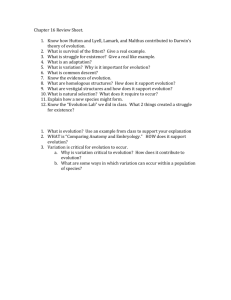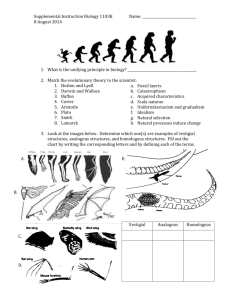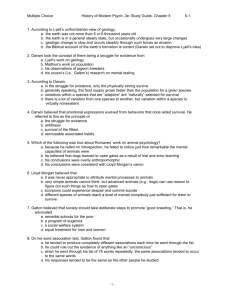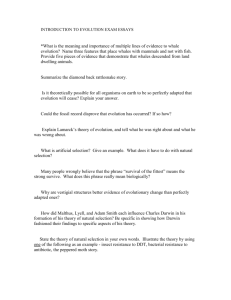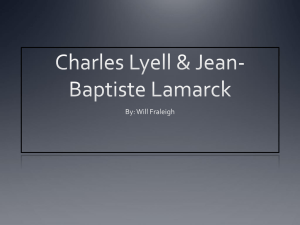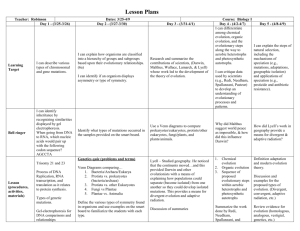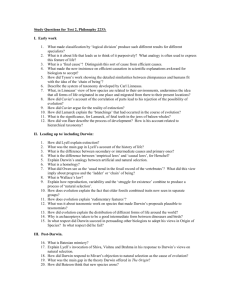charles lyell pack
advertisement
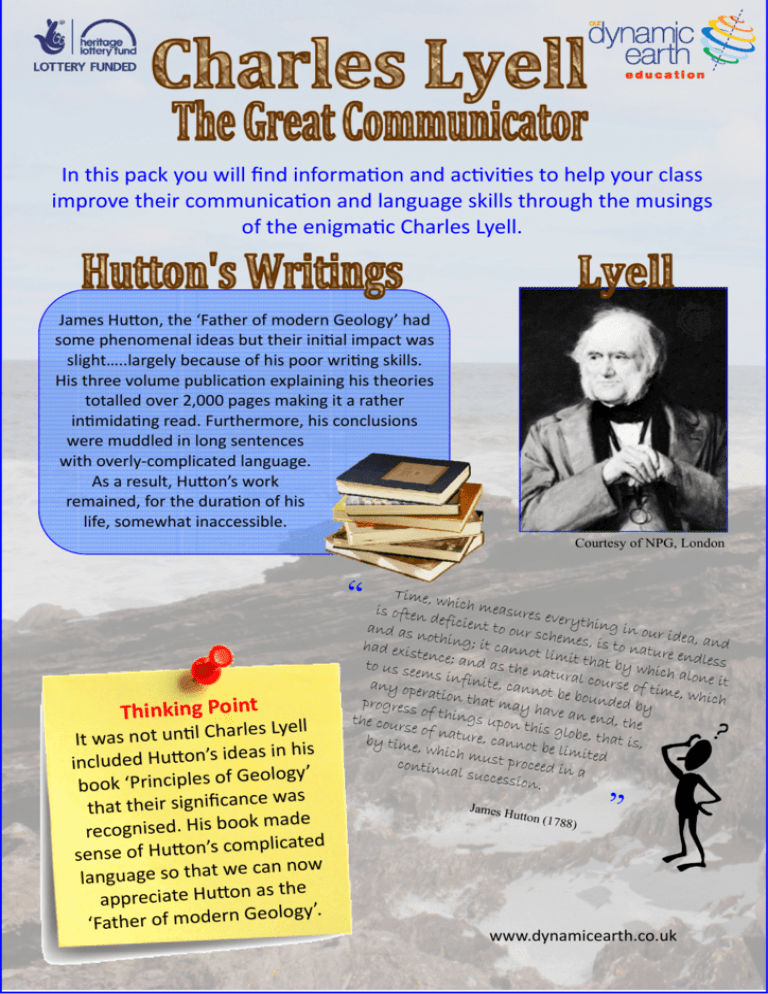
In this pack you will find informa on and ac vi es to help your class improve their communica on and language skills through the musings of the enigma c Charles Lyell. James Hu on, the ‘Father of modern Geology’ had some phenomenal ideas but their ini al impact was slight…..largely because of his poor wri ng skills. His three volume publica on explaining his theories totalled over 2,000 pages making it a rather in mida ng read. Furthermore, his conclusions were muddled in long sentences with overly‐complicated language. As a result, Hu on’s work remained, for the dura on of his life, somewhat inaccessible. Courtesy of NPG, London “ Thinking Point rles Lyell It was not un l Cha eas in his included Hu on’s id Geology ’ book ‘Principles of ce was that their significan ok made recognised. His bo mplicated sense of Hu on’s co e can now language so that w as the appreciate Hu on Geology’. ‘Father of modern Time, w hich me a is often deficien sures everythin t to our g in our and as schemes nothing idea, an , ; it cann d is to na had exis t ure end ot limit tence; a l e t s h nd s at by w to us se hich alo ems inf as the natural n e c i it ourse of nite, can any ope time, wh not be b ration t o i c u h hat nded by progress of thing may have an e n s upon t the cour se of na his glob d, the t e u , re, cann t by time ot be lim hat is, , which ited must pr oceed in continu al succe a ssion. James H utton (1 788 ) ” www.dynamicearth.co.uk These ac vi es have been designed to help your class understand the significance of the work of Charles Lyell as the ‘Great Communicator’. They also aim to help pupils develop their own communica on skills by using different ways to express thoughts and ideas effec vely. Using the examples at the end of the pack, get the class to work in pairs to iden fy the nursery rhyme tles that have been made overly complicated. Once this has been done why not get pupils to come up with their own complicated sentences based on a topic and get their partner to decode them? Topic ideas might include: • hobbies and interests • everyday life • story tles Presenter Skills Using the science facts at the back, focus on how to make them sound exci ng using ‘voice dynamics’ and body language. Put the class in small groups and get them to work on one fact each. Read one in a flat, boring voice as an example of what not to do. Aspects to think about include varying tone, drama c pauses, volume changes and hand gestures. Scien fic Pic onary Get the class to try and draw a well‐ known scien fic theory. The illustra on should make the theory easy to understand without the use of words. This ac vity allows pupils to get crea ve and consider different ways of communica ng ideas. Theories might include: evolu on, the big bang, or ‘deep me’. Get your class to have a go at the ‘code cracker’ worksheet at the back of this pack. As an extension, encourage pupils to make their own code for others to crack. Rather than numbers they may choose to use symbols or clues. www.dynamicearth.co.uk Lyell’s geological conclusions were influenced by those of Hu on. Building on Hu on’s idea of ‘deep me,’ Lyell conclusively demonstrated that the Earth was indeed much older than was believed at the me. He argued that it was slow‐ moving processes that worked to shape the Earth – an argument that could not have stood without Hu on's new, extensive me‐scale! Furthermore, Lyell was able to date the age of rocks by looking at the fossils hidden within. Get the class to design a me line that illustrates the significance of Hu on’s ‘deep‐ me’ theory. Start at the Earth’s forma on 4.6 billion years ago and work up to the present day, marking any significant events such as first life and when humans first appeared. Now do a second me line that illustrates the me scale followed before Hu on’s theory. As people believed that the Earth was only a few thousand years old and that things such as mountains and rivers were formed in sudden catastrophic events, this me‐line will be much shorter and all marked events will be much closer together. A comparison of these me lines will show how significant Hu on’s theories are and will help illustrate the enormity of me and the rela vely small role that humans have played. “Consider the Earth’s history as the old measure o f the English Ya rd, the distance fr om the King ’s n ose to the p of his outstretched h and. One stroke of a nail file on his middle finger e rases human history.” John M cPhee 1981 Why not take your class outside to make a physical representa on of this me line? Use a tape measure in the playground to start your me line, then ask pupils to stand at various points to represent key events. This should really help show how massive the Earth’s me scale is! www.dynamicearth.co.uk Lyell used some of Hu on’s theories to take his work further. This is one example of how ideas formed during the Sco sh Enlightenment have shaped our modern understanding of the world around us. Use our ‘Characters of The Enlightenment’ card templates and examples to profile the most famous people from this era of Scotland’s history. This can easily be extended to include other famous scien sts such as Charles Lyell. Thinking Point ok accompanied o b s ll’ e Ly f o y p co A his voyage upon Charles Darwin on y is this the Beagle. But wh significant?! Encourage your class to do a bit of research on the work of Lyell and his theories. Ask the pupils to present their findings. They may choose to do a poster, a presenta on or a PowerPoint. The idea is to consider different ways of conveying informa on effec vely. ays in which w e th r e d si n o c t: Hin eep‐ me may d f o ry o e th ’s n o Hu win's theory of ar D d ce n e u fl in ve a h evolu on. www.dynamicearth.co.uk ..for the Timeline h p://bgs.ac.uk/discoveringGeology/ me/ meline/home.html?src=topNav h p://serc.carleton.edu/quantskills/ ac vi es/TPGeoTime.html This pack has been made possible through funding from the Heritage Lottery. Scotland’s Time Lord Workshop: Learn how ‘Time Lords’ James Hutton and Arthur Holmes realised our planet was ancient. Create a geological formation out of play-dough, discover radioactivity and marvel at the enormity of geological time. The Tour: Through funding from Heritage Lottery, we celebrate one of the most influential Scottish thinkers of all time. James Hutton, the father of modern geology is brought to life in a £1million redevelopment to the beginning to the tour. Experience cutting edge technology and state of the art interactive displays before being transported hundreds of millions of years back through ‘deep time’ to the very beginning of our planet in our brand new ‘Time Machine’ Continuing your journey, you will fly across glaciers, feel the Earth move beneath your feet and experience the chill of polar ice. – All this before embarking on a 4DVENTURE across the globe and crash landing in a tropical rainforest. Throughout the year you will also witness spectacular 360 degree films in our ShowDome, the only one of it’s kind in Scotland. It’s the Mother Earth of all adventures. ...For the Enlightenment h p://www.educa onscotland.gov.uk/ sco shenlightenment/index.asp ...For Charles Lyell and Geology h p://www.uamont.edu/facultyweb/ edson/ a_short_history_of_historical_ge.htm h ps://www.angus.gov.uk/history/ features/people/lyell.htm Outdoor Learning: Discover the amazing and violent geological history of Scotland as told in the rocks of Arthur’s Seat with engaging tours led by our experienced education team. This resource was developed in line with Social studies > People, place and environment; Literacy and English > Listening and talking and Sciences > Topical Science. A male and his female counterpart embarked on a journey on which they ascended a gradient. A lady with a biblical name had a fleeced creature who had not yet developed into adulthood. A number, greater than two but less than five, of visually‐impaired rodents. There was once a mature person who inhabited a piece of a re one would normally wear on one’s feet If Charles Darwin hadn’t read Charles Lyell’s book and realised that the Earth was really old, he might not have come up with the theory of evolu on. Planet Earth is around 4.6 billion years old. If you imagine scaling that down to 46 years humans only evolved 6‐7 days ago. Many meteorites have not changed since the forma on of the Solar System. The oldest ones found are 4.6 billion years old. The oldest rocks in Scotland were formed 2.8 billion years ago. That means they have been around for over half the age of the Earth. If you drove at 60 mph through the planet, it would take you about 5 minutes to drive through the thin‐ nest parts of the crust. It would take you 63 hours to reach the centre. During the Sco sh Enlightenment, Edinburgh was a ‘hot‐bed of genius’ Many people believe that the ideas and advancements made then are s ll shaping the world today. 1 C 3 4 5 6 7 V 9 10 11 12 S E 15 16 17 L P 20 H 22 23 24 O W 27 28 29 30 31 32 33 D 35 36 37 K 39 N 41 B 43 44 45 46 U 48 49 50 T X 53 54 55 F 57 58 59 60 61 62 Q 64 65 66 67 68 J 70 71 72 73 U 75 76 G 78 79 80 A 82 83 84 I M 87 88 R 90 Y 92 93 94 95 96 97 98 99 Z Lyell would have found it difficult trying to untangle what Hu on was saying with all his complicated language. Can you, like Lyell, try and decode the sentences below? 1) 21, 47, 51, 51, 25, 40 _ 85, 13 _ 51, 21, 14 _ 56, 81, 51, 21, 14, 89 _ 25, 56 _ 86, 25, 34, 14, 89, 40 _ 77, 14, 25, 18, 25, 77, 91. Answer: 2) 18, 91, 14, 18, 18 _ 21, 14, 18, 19, 14, 34 _ 74, 13 _ 51, 25 _ 74, 40, 34, 14, 89, 13, 51, 81, 40, _ 34, 14, 14, 19 _ 51, 85, 86, 14. 34 Answer: Now put your own sentence about Charles Lyell into code using the table above and get a friend to try and work it out. My Sentence: 1726-1797 ‘Father of Modern Geology’. Proposed that we are living on an ancient planet. Argued that granite and basalt were once molten and that there is a ‘heat-engine’ in our planet which forms new rock. James Hutton 1723-1790 Chemist who discovered Carbon dioxide: he called it ‘fixed air’. Demonstrated that hydrogen-filled balloons will rise up and taught Thermodynamics—the links between heat and energy. Joseph Black Image from Education Scotland 1714-1794 Poet and Songstress who encouraged a young Walter Scott. She hosted parties for all the scientists and artists in Edinburgh and was a very strong, independent woman.. Alison Rutherford Image from Education Scotland
